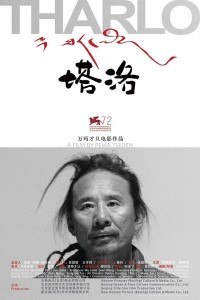Tharlo
ཐར་ལོ | 塔洛
China, 2015, b&w, 1.85:1, 124 mins.
Director: Pema Tseden 万玛才旦.
Rating: 3/10.
Grindingly slow b&w study of a Tibetan shepherd, his ID card and a come-on hairdresser.
Somewhere on the Himalayan plateau, China, the present day. Forty-something shepherd Tharlo, aka “Ponytail” (Shide Nyima), has finally come down to the city from his flock on the mountain to obtain an identity card at the local police station. It’s the first ID card he has ever had, as he was raised as an orphan and doesn’t even know his exact age. To entertain the police chief, Doje (Tashi), Tharlo performs his party piece of reciting the sayings of Chairman Mao from memory. Doje tells Tharlo to go first to the photo studio of Dekyi to have his picture taken. Dekyi recommends he should first visit the hairdresser’s opposite to have his hair washed; later, while waiting for his photo to be developed, Tharlo revisits the hairdresser, Yangtso (Yangshik Tso), who’s taken a liking to him and invites him to karaoke that evening. Tharlo ends up very drunk and in Yangtso’s bed. Next morning Yangtso suggests they travel together – to Lhasa, Beijing, Shanghai, Hong Kong and beyond. After delivering his photo to the police station, Tharlo drives back to the mountains on his motorbike to tend his sheep. Living on his own, he drinks heavily, thinking of Yangtso and learning songs for when they next karaoke together. One night, when Tharlo is asleep, a large number of sheep are killed by wolves and Tharlo is blamed by the owner (Kimba). Intending to collect his ID card and go away with Yangtso, he drives down to town and gives her his savings – RMB160,000 – to look after in the meantime.
REVIEW
After his mildly more accessible – but still dramatically awkward – archer drama The Sacred Arrow 五彩神箭 (2014), China-born Tibetan festival darling Pema Tseden 万玛才旦 returns to his more morose, interior style with Tharlo ཐར་ལོ | 塔洛, a grindingly slow, two-hour-long look at a middle-aged Tibetan shepherd, his ID card and a pretty hairdresser he falls for in town. Based on a short story by the director – and looking like it, from the lack incident and long, dead spaces – it has a slightly different feel from Pema Tseden’s earlier features by being (a) processed in b&w and (b) more dependent than ever on long, fixed takes, which this time are heavier on medium shots and close-ups as well as being geometrically composed. But like all of Pema Tseden’s stylistic affectations, they have a second-hand, acquired feel, driven neither by the film’s subject-matter nor by any deeper artistic convictions. And like all of his films, this one has a so-what feel when the lights finally come up.
Though the story’s exact location is never specified, the film is again largely shot in the director’s birthplace of the Tibetan Autonomous Prefecture of Hainan, Qinghai province, China, in this case around Tongde county. No compelling artistic reason is made for processing the movie in b&w and, in sequences like the photo studio shoot and karaoke bar, the colourful costumes and backgrounds can almost be felt pushing through the digitally generated monochrome. Though little emerges from the sparse/everyday dialogue about the characters, performances are reasonably engaging, with dramatist-comedian Shide Nyima 西德尼玛 (in his film debut) believably naive as the shepherd and singer Yangshik Tso 杨秀措 (aka Yangchuk Tso) ditto as the come-on hairdresser who awakens his imagination. But their relationship never develops beyond the obvious and is schematically conceived more than anything else.
As the local police chief, Tashi 扎西 adds some mild irony, notably in the sequences where Tharlo does his party piece of reciting Chairman Mao’s sayings by heart against a background with the slogan “Serve the People”. Presumably intended as some kind of political satire, underlining the obvious point of Tibetans’ cultural disorientation, these sequences contain the extra joke of Tashi having played Mao on screen – an amusing footnote but hardly more.
The monochrome images by new d.p. Lv Songye 吕松野 are more forceful in the mountainous exteriors of the second half than the interior-heavy first half. Music is mostly Tibetan songs sung by the leads or heard on the radio.
CREDITS
Presented by Heaven Pictures (Beijing) Culture & Media (CN), Beijing Ocean & Time Culture Communication (CN), Beijing Yihe Star Film Production (CN), New Heaven Picture (Beijing) Culture & Media (CN). Produced by Heaven Pictures (Beijing) Culture & Media (CN), Beijing Ocean & Time Culture Communication (CN), Beijing Yihe Star Film Production (CN), New Heaven Picture (Beijing) Culture & Media (CN).
Script: Pema Tseden. Short story: Pema Tseden. Photography: Lv Songye. Editing: Song Bing. Editing supervision: Liao Qingsong. Music: Wang Jue. Art direction: Taktse Dondrup. Sound: Dukar Tserang.
Cast: Shide Nyima (Tharlo, aka “Ponytail”), Yangshik Tso (Yangtso), Tashi (Doje, police chief), Kimba (sheep owner), Dekyi Tserang (himself).
Premiere: Venice Film Festival (Orrizonti), 4 Sep 2015.
Release: China, 9 Dec 2016.
(Review originally published on Film Business Asia, 7 Sep 2015.)
